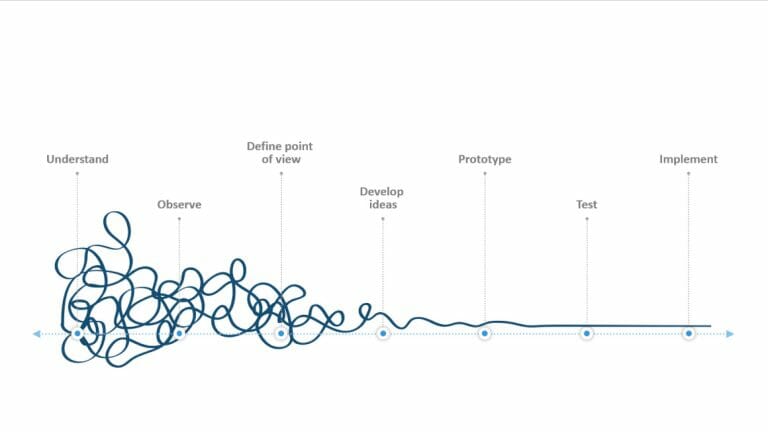
Overcoming Stage Fright Before Presentations: 7 Helpful Tips and Tricks
Stage fright, sweaty palms, and a queasy stomach. According to studies, this is normal for around 80 percent of people before a presentation. Nearly everyone who gives a talk knows the feeling of uncertainty. We imagine all the things that could go wrong and feel increasingly uncomfortable as the deadline approaches.
But what if this nervousness before each new presentation becomes even greater? In this article, we will show you the various ways to deal with stage fright and overcome it.
What is Stage Fright?
The term “stage fright” originally comes from French and is derived from the term “fièvre de la scène,” which translates to “stage fever” in English. Stage fright refers to the tension and nervousness before a presentation, a public appearance, or even job interviews. Especially when we perform in front of unfamiliar people, we fear embarrassing ourselves and making mistakes.
For instance, when we talk to friends, we are likely not nervous. We know the person we are speaking to and feel comfortable in their presence. However, as soon as we approach a stranger on the street or engage in a conversation with someone unknown, many of us start feeling uncomfortable. The larger the crowd of strangers, the stronger stage fright often becomes.
In reality, stage fright is nothing but acute stress. It manifests through signals like a racing heart, blushing, and heat, and mentally through signals like irritability and forgetfulness. While some people experience a certain level of stage fright as positive and motivating, many others struggle with it and feel inhibited.
Why Do We Experience Stage Fright Before Presentations?

The brain is a wonderful thing. It works up until the moment you have to stand up and speak in public
Mark Twain
Who doesn’t know this feeling? You’ve gone through your presentation several times and you know everything about the topic. But then the moment of the presentation arrives, and suddenly your nerves are on edge, and all the information in your brain seems to have disappeared.
This usually happens because we fear embarrassing ourselves on stage, or while speaking, by making mistakes. Yet, mistakes are human and happen to everyone at some point. The reason we have such fear is that errors are consistently punished in our society. This could be in school, at university, or at home, which now leads us to fear making mistakes on stage, for which we might be penalized.
Even Professionals Experience Stage Fright
Although many people think that stage fright is related to being an amateur, this is a common misconception. Even many famous or experienced individuals struggle with stage fright. It helps many beginners and those struggling with speaking anxiety to know that even people in the limelight experience this.
Joaquín Phoenix, winner of the Golden Globe and nominated for two Oscars, once said that despite being in the spotlight for 30 years, he still gets as nervous every time as if it were his first public appearance. Knowing that even globally recognized personalities deal with stage fright shows that no one is alone in this, and even the best speakers are plagued by it.
What Causes the Fear of Presentations?
How nervous and anxious we are before speeches or performances varies individually and has different causes. Many individuals have high standards for themselves and are very self-critical. If it’s difficult for one to be satisfied with their own performance, stage fright and nervousness increase.
Often, it then becomes challenging to focus on the important aspects of a presentation. These include questions like what you want to achieve with your speech and what you want to convey to your audience. Moreover, if you have high standards for yourself, consider in advance what needs to happen for you to be satisfied with your speech. Set realistic goals that you can achieve.
Learn more about how to define successful goals for a presentation in our blog “Define Goals for Presentations“.
Cause #1: Negative Experiences
Almost everyone can recall instances where they were in the spotlight and felt a strong sense of inner restlessness or nervousness. As if that weren’t enough, you now have memories in your head, such as other people laughing at you, which continue to haunt you to this day.
Such moments are stored in our minds as embarrassments. They are reliably guarded by our memory to share with us in the most inconvenient moments. Especially before a presentation, these memories resurface, and out of fear that such a scenario might repeat itself, stage fright develops.
Cause #2: Lack of Practice
Another reason for stage fright might be that you simply haven’t had many opportunities to be on stage or give presentations. Because: The more experienced you are in a field, the more confidence you have in your own abilities. The more presentations you give, the more you develop a sense for various aspects.
For example, you can better estimate how your voice sounds when you speak for a longer period. Or how many steps you can take on stage without seeming fidgety. Learn how to present confidently with the right speaking techniques here.
Therefore, seize every opportunity presented to improve your skills. Because here too, practice makes perfect!
Did You Know? Stage Fright Can Be Beneficial Too
Many people who suffer from stage fright wish they could just switch it off. Little do they know that the energy contained in stage fright can be put to valuable use. For this reason, resisting it is not advisable.
Transform the Energy of Your Fear
Especially if you suffer greatly from stage fright, it’s important to realize that you feel the stage fright more intensely than your audience does. Often, your fear is not visible from the outside or at least not as strong as you imagine it to be. However, what remains visible to the listeners are reactions to fear. For example, a rigid facial expression and frenetic movements, or shallow breathing.
Breathing plays a significant role in stage fright. When we feel fear or even panic, we tend to breathe just enough to avoid fainting. However, this keeps us stuck in the feeling of fear. To release this blockage, it’s important to breathe deeper and longer, allowing the energy to flow again. This is one of the reasons why stage fright improves after a few minutes of speaking and you get into the flow of the presentation.
Stage Fright or Speech Anxiety?

Stage fright, as mentioned earlier, is something quite normal and can even be useful. Even experienced speakers sometimes struggle with it and are accompanied by nervousness and tension during public appearances. However, this is not necessarily a bad thing.
The body releases adrenaline during stage fright, and because you are focusing solely on the present situation, your concentration and attention increase.
Speech anxiety, on the other hand, also known as logophobia, belongs to social anxieties. The fear associated with it is based on the fear of embarrassment, rejection, and failure. As presenters, we don’t want anyone to notice that we’re afraid, which in turn amplifies the fear. The same mental scenario repeats in our heads. We convince ourselves that we will embarrass ourselves and be laughed at.
Speech anxiety: What fears trigger it before presentations?
The so-called logophobia regularly induces panic in speakers. But what fears does it actually trigger?
- The fear of being in the spotlight
Particularly shy individuals dislike the idea of being in the spotlight and the center of attention. The feeling of being observed by everyone present can trigger anxiety and make one hesitant while giving the presentation.
- The fear of failure
Those who suffer from speech anxiety often worry about how the presentation will be received by the audience. The thought of embarrassing themselves in front of the listeners leads to intense feelings of shame even before the presentation starts. People with speech anxiety might even prefer not to step onto the stage at all.
Overcoming the Fear of Presentations: Proper Preparation Helps
To learn how to manage your stage fright, it’s helpful to prepare adequately for the presentation. Although there’s no one-size-fits-all solution for stage fright, there are still some helpful preparation tips that we’ll present to you below:
- Practice and Rehearsals: If you’re preparing for a presentation or speech that needs to be well-prepared, it’s important to rehearse it multiple times beforehand. To build confidence, it’s also recommended to practice in front of an audience. For this, family and friends from your circle are a good option.
- Visualize Success: Imagine how fulfilling it will be to complete your presentation confidently and calmly. This method, originating from elite sports, is a popular way to boost courage before a competition.
- Self-Observation: Take stock and consider, for example, the positive or negative experiences you’ve had with stage fright. Also, think about which appearances you found positive. It’s important not to focus on traumatic experiences but rather to reflect on what you’re good at and what experiences you’ve had where you might have had your stage fright under control.
- Practice Makes Perfect! This proverb isn’t just true for presentations. Even more self-assured behavior can be trained. Use opportunities to speak in front of others to bring routine to your presentations and reduce your fear.
Overcoming Stage Fright and Speech Anxiety Before Presentations: 7 Helpful Tips and Tricks
Even if you prepare in advance and try to overcome your stage fright, you might still be plagued by stage fright or speech anxiety right before a presentation. With the following tips, you can relax and present confidently just before your speech.
- Deep Breathing and Relaxation
As simple as this trick may sound, using the right breathing technique can help manage your nervousness. When you feel your heart rate increase and your breathing become erratic, try to calm your breathing rhythm.
Inhale through your nose and exhale through your mouth several times. Focus on your breathing flow and feel your lungs filling with air. - Break the Ice
The introduction to your presentation and the first impression you leave on the audience are crucial. Build a connection with your listeners and greet them.
If you feel comfortable, you can break the ice with a bit of small talk, like making a positive remark about the venue or commenting on the weather. This way, you’ll quickly stop feeling like you’re facing enemies and realize that there are friendly individuals in your audience. - Everyone Likes You
Imagine that every person in your audience likes you. This thought isn’t entirely far-fetched, as you’ve been invited because people want to hear your insights on a specific topic. Focus on the ideas you want to convey, what your audience wants to hear, and how you can inspire them with your concepts. Learn more about tailoring your content to your audience’s needs. - Your Fear is Invisible
We often imagine that every slight sign of our insecurity is noticeable to the audience. This leads to standing rigidly in one place, pressing our hands against our upper body, and fearing the worst.
However, even if we assume that shaky knees or a trembling voice are glaringly obvious, the audience usually focuses solely on the presentation and what you’re saying. Additionally, physical signs of nervousness tend to disappear after a few minutes of focusing on the speech. - Take a Walk
Although this tip may not seem extraordinary at first glance, stepping outside for fresh air can clear your mind. If you leave your phone behind, you can concentrate on the fresh air and effectively reduce stress hormones through physical activity. - Don’t Take Your Negative Thoughts Too Seriously
It’s easy to imagine all the things that could go wrong before a presentation. Our brains get particularly creative here: we envision ourselves being embarrassed on stage, having a panic attack, or speaking complete nonsense. As creative as this might be, it’s not helpful, and these thoughts harm us more than they help.
While it would be nice to simply turn off these thoughts, it’s not that straightforward. As an alternative, it often suffices not to take these thoughts too seriously and to realize that they don’t reflect the truth. By doing so, we accept these thoughts while also relaxing better before the next presentation.
- Listen to Music
Similar to taking a walk, listening to music can help reduce stress. With our favorite tunes in our ears, we can escape from our script and the impending presentation for 15 minutes, which can work wonders. Music can also be combined with a walk to work wonders in helping us relax.
Getting Long-Term Control Over Stage Fright

Especially for shy and introverted individuals, it can happen that stage fright worsens over time. This can occur because the fear of stage fright leads to avoiding situations where stage fright might occur. To prevent it from getting that far, it can be helpful to develop relaxation or breathing techniques, as well as rituals, that you can go through before a presentation. This way, you can calm yourself down and relax before public appearances.
If your stage fright is so severe that it causes panic states and depression, it’s advisable to talk to a therapist about it. Talk therapy and cognitive-behavioral therapy can be helpful in getting a grip on the anxiety.
Conclusion: Take Our Tips to Heart and Overcome Your Stage Fright and Speech Anxiety
Speech anxiety can limit you both in your professional and private life, holding you back from achieving your goals. However, anyone who truly wants to can overcome stage fright and speech anxiety!
And if you make a mistake despite everything, stay calm and handle it skillfully. You can read more about this our article “How to handle mistakes in presentations“.
Take our tips from this article to heart and don’t hesitate to contact us at [email protected] for further questions.
Looking for visually supportive and professionally designed slide templates? Browse our shop. We have numerous slides available for download covering various (business) topics. Check it out today! ► Visit the Shop
Here are some more articles you might find interesting:




